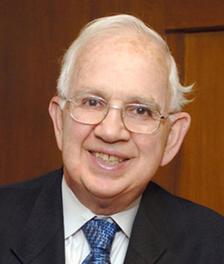 |
|
| Harold Kushner | |
Rabbi Harold Kushner, a "practical public theologian whose bestselling books assured readers that bad things happen to good people because God is endowed with unlimited love and justice but exercises only finite power to prevent evil," died April 27, the New York Times reported. He was 88. Several of his 14 books became bestsellers, "resonating well beyond his Conservative Jewish congregation outside Boston and across religious boundaries in part because they had been inspired by his own experiences with grief, doubt and faith."
Rabbi Kushner wrote When Bad Things Happen to Good People (1981) after the death of his son, Aaron. Just hours after the birth of the Kushners' daughter, three-year-old Aaron was diagnosed with a rare disease, progeria, in which the body ages rapidly. He died in 1977, two days after his 14th birthday.
"Like a lot of children who feel they're going to die soon, he was afraid he would be forgotten because he didn't live long enough, not knowing parents never forget," Rabbi Kushner told the alumni magazine Columbia College Today in 2008. "I promised I'd tell his story."
Published by Shocken Books, When Bad Things Happen to Good People rose to #1 on the Times' bestseller list and transformed Kushner into a popular author and commentator. His thesis, as he wrote in the book, was straightforward: "It becomes much easier to take God seriously as the source of moral values if we don't hold Him responsible for all the unfair things that happen in the world."
Kushner was born in the East New York section of Brooklyn, N.Y. His father owned Playmore Publishing, "which sold toys and children's books, especially Bible stories, from a shop at Fifth Avenue and 23rd Street that he hoped his son would take over. Harold felt he lacked his father's business sense," the Times noted.
"The only thing worse than competing with my father and failing would be competing with him and outdoing him," Rabbi Kushner said. "Going into the rabbinate was not a way of saying, 'I'm rejecting what you're doing.' I'm affirming it."
Among Rabbi Kushner's other books are How Good Do We Have to Be? A New Understanding of Guilt and Forgiveness (1997); Living a Life That Matters (2001); and The Lord Is My Shepherd: Healing Wisdom of the 23rd Psalm (2003). He also collaborated with the novelist Chaim Potok in editing Etz Hayim: A Torah Commentary, the official commentary of Conservative Jewish congregations (2001).
Rabbi Kushner often said he was amazed at the breadth of his readership across theological lines. In 1999, he was named clergyman of the year by the organization Religion in American Life. In 2007, the Jewish Book Council gave him a Lifetime Achievement Award.
In his book When All You've Ever Wanted Isn't Enough (1986), which was intended to be "an examination of the question of why successful people don't feel more satisfied with their lives," Rabbi Kushner observed: "Drawing on the Biblical book of Ecclesiastes, it suggests that people need to feel that their lives make a difference to the world. We are not afraid of dying so much as of not having lived."

